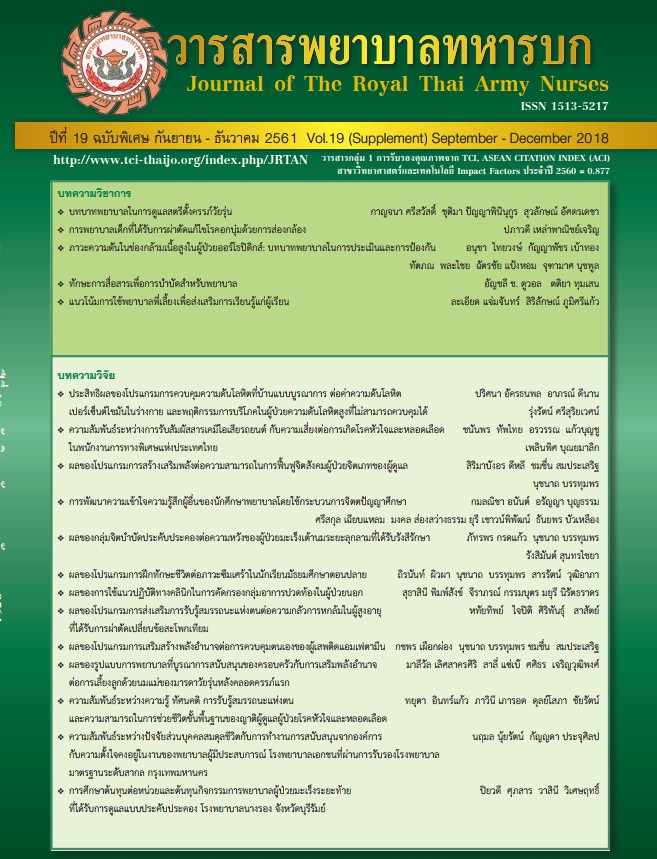Factors Predicting Caregiver’s Readiness for Dependent Older Persons in Transition Period on Hospital to Home
Keywords:
Caregiver’s Readiness, Dependent Older Persons, TransitionAbstract
This research aimed to investigate the predictive factors on the caregiver’s readiness of dependent older persons. Meleis’s Transitional Theory was guided as the conceptual framework of this descriptive research. The purposive sample composed of 117 caregivers of dependent older persons who were family members and took the main responsibility of continually taking care of the patients. The instruments were the demographic questionnaire, the attitude of caregivers toward older persons caregiving, the knowledge of care, the social support, the role strain, and the caregiver’s readiness. Data were analyzed using descriptive statistics, Pearson’s correlation, and stepwise multiple regression. The findings revealed that caregivers of dependent older persons had a moderate level of readiness. The analysis of relationships between the attitude of caregivers toward older persons and the knowledge of care of caregivers were significantly positive correlated with caregiver’s readiness for dependent older persons at the level of 0.05 (r = .256, r= .348 respectively). The role strain as caregivers was significantly negative correlated with caregiver’s readiness for dependent older persons at the level of 0.05 (r = -.447). However, caregivers’ socioeconomic and the social support were not correlated with the readiness of caregivers of dependent older persons. Furthermore, the caregiver’s role strain and the attitude of caregivers toward older persons were significantly predictive factors for caregiver’s readiness of dependent older persons at the level of 0.05 (β = -.429, β = .220 respectively). These three variables could predict 24.8% of the variance of caregiver’s readiness. The findings suggest that the multidisciplinary team should provide support for the caregivers of dependent older persons for releasing their tensions as being a caregiver and other family members’ participation in taking care of dependent older persons should be encouraged, in order to the primary caregivers could have time to take care of themselves.
References
2. Potisita C. Thai families in transition situation through social and demographic. Nakhon Pathom: Population and Social Publishing; 2009. (in Thai)
3. Connor, M. O., Moriarty, H., Baer, M. R., & Bowles, K. H. Identifying critical j factors in determining discharge readiness from skilled home health: An interprofessional perspective. Research in Gerontological Nursing. 2016; 9(6), 269-277.
4. Kasemkitwattana S, Prison P. Chronic Patients’ Family Caregivers: A Risk Group That Must Not Be Overlooked. Thai Journal of Nursing Council. 2014; 29(4) 22-31. (in Thai)
5. Meleis, A. I. Transitional theory: Middle-range and situation-specific theories in nursing research and practice. New York: Springer Publishing Company; 2010.
6. Wivatvanit S, Jitapankul S, Kespichayawattana J. Research Reports The availability and needs of patients who have been discharged from general hospitals and hospital centers Ministry of Public Health: One day survey. Foundation for Thai Elderly Research and Development Institute; 2012. (in Thai)
7. Laura, N. G. & Karen, R. Factors associated with caregiver readiness to use nonpharmacologic strategies to manage dementia-related behavioral symptoms. International Journal of Geriatric Psychiatry. 2014; 29, 93-102.
8. Phommatat P. Factors influencing caregivers’ readiness in caring patients with tracheostomy in transition from hospital to home. The journal of Faculty of Nursing Mahidol University; 2011. (in Thai)
9. Charoenwuttimakorn P. Factors related to preparedness for caregiving among caregivers of patients with ischemic stroke. The journal of Faculty of Nursing Burapha University; 2012. (in Thai)
10. Sasat S. Care for the Elderly with Dependent Care in Long-term Care: Quality of care and knowledge, attitude and practice of nursing personnel. University Development Project National Research Fiscal Year 2011 Senior Social Cluster; 2012. (in Thai)
11. Kogan, N. Attitude toward old people: The development of a scale and an examination of correlates. Journal of Abnormal and Social Psychology. 1961; 62: 44-54
12. Atchley, R.C. The social forces in later life. (3rd ed). California: Wadworth; 1980.
13. Imote P. Factors influencing home care behavior of caregivers of stroke patients. Master of Nursing Science Thesis Christian University; 2007. (in Thai)
14. House, J. S. The Nature of Social Support. In M. A. Reading (Ed.), Work Stress and Social Support. Philadelphia: Addison-Wesley; 1981.
15. Wirojratana, V. Development of the thai family care inventory. Unpublished doctor of philosophy in nusing, Faculty of graduate studies, Oregon Health & Science University; 2002.
16. Stewart, B. J. & Archbold, P. G. New measures of concepts central to and Understanding of a caregiving. Unpublished manuscript. School of Nursing, Oregon Health Science University; 1986.
17. Nima Y. & Harsuwankrit S. Medical and patient care consistent with the Muslim way. Documentation for the Human Development Network. Songkhla: National Health Security Office, Songkhla Area and Southern Health System Research Institute Prince of Songkla University.
18. Sasat S. Nursing care for the elderly: common problems and guidelines for care. (3rd ed). Bangkok: Chulalongkorn University Press; 2011. (in Thai)
19. Artsanthia J, Kampraw P. Care model for the elderly in the community, Journal of The Royal Thai Army Nurses. 2014; 15(3), 123-127. (in Thai)
20. Artsanthia J, Pomthong R. 21st Century Care for the Elderly: Challenges in Nursing, Journal of The Royal Thai Army Nurses. 2018; 19(1), 39-46. (in Thai)
Downloads
Published
How to Cite
Issue
Section
License
บทความหรือข้อคิดเห็นใดใดที่ปรากฏในวารสารพยาบาลทหารบกเป็นวรรณกรรมของผู้เขียน ซึ่งบรรณาธิการหรือสมาคมพยาบาลทหารบก ไม่จำเป็นต้องเห็นด้วย
บทความที่ได้รับการตีพิมพ์เป็นลิขสิทธิ์ของวารสารพยาบาลทหารบก
The ideas and opinions expressed in the Journal of The Royal Thai Army Nurses are those of the authors and not necessarily those
of the editor or Royal Thai Army Nurses Association.





